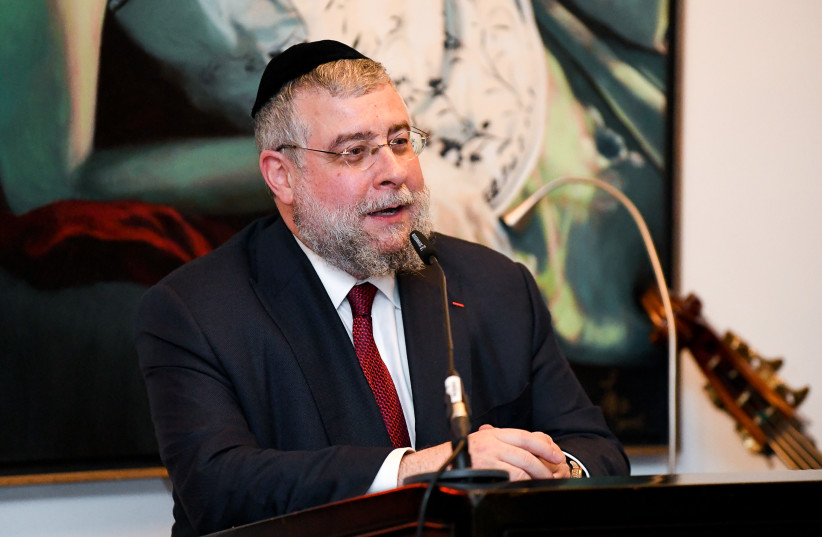As part of his position, Felix Klein played a leading role in developing a comprehensive strategy to combat antisemitism in Germany, giving special attention to Jewish life in politics and society during difficult times and raising awareness of Jewish life in Germany.
One of the reasons for awarding him the prize: "He always spoke clearly in favor of not only identifying the causes of antisemitism and hatred of Israel but also combating them more efficiently and systematically through far-reaching legislative proposals and educational initiatives."
German Interior Minister Nancy Faeser said: "We must unite all the forces in our society - the rule of law, politics, business, and civil society - to fight antisemitism and protect Jewish life. Dr. Felix Klein is a role model here: since taking office in 2018, he has embodied the determination to fight hatred of Jews."
"He also embodies our country's commitment to strengthening Jewish life and making it visible. I am proud that the Conference of European Rabbis is honoring his achievements with this year's Moshe Rosen Prize. This is a very worthy award for Dr. Klein. At the same time, it is a reminder for all of us to do everything we can to protect the Jews in Germany."
The President of the Conference of European Rabbis, Chief Rabbi Pinchas Goldschmidt, emphasized in his speech the important work of Felix Klein: "There are few people in such positions who need to make their voices heard like the German federal government's commissioner for the fight against antisemitism."
"Felix Klein, for many years, continuously fought against antisemitism and hatred of Jews in all its forms. Felix Klein does everything he can for the Jews in Germany and abroad. We are grateful to him and to the German government, which attaches such central importance to the future of Judaism, and we would like to express our appreciation for his commitment to the fight against antisemitism and to Jewish life by awarding him with the Moshe Rosen Prize of the Conference of European Rabbis."

Never been more to do
Goldschmidt also used his speech in Berlin for an appeal: "There has never been more to do than today," said the chief rabbi, "because antisemitism, whether it comes from the extreme left, extreme right, or extreme Muslims, is not the problem of Jews, but of society as a whole."
The prize, chosen by the CER for Felix Klein, is a painting by the Jewish-French-Austrian artist born in Moscow Alexander Aizenshtat, dedicated to the victims of the systematic mass murder of up to 300,000 physically, mentally, and mentally disabled people carried out by the Nazi regime in Germany and Europe between 1939-1945, which is considered the precursor to the Holocaust.
According to Aizenshtat, activities like those of Felix Klein and other winners of the Moshe Rosen Prize are intended to ensure that something like the T-4 program and the Holocaust will not be repeated anywhere.
Haim, the son of Alexander Aizenshtat, said in an exclusive conversation with Maariv, "In my eyes, giving a painting of my father is tikkun olam, giving the Germans a painting that is about the greatest atrocities that started the Holocaust to someone who fought against antisemitism is huge."
"Father always says that the beginning of the Nazi disease is that no one spoke when they killed the sick, and this led to the Holocaust. If they had stopped the killing of the sick, there would be no Holocaust; my dream is to see Father's work everywhere and that everyone would be obliged to see the horrors the Nazis did to people with disabilities."
Sandra, who works in Dr. Klein's office, told Maariv about the huge honor given to Dr. Klein. "This award shows that not only the rabbis recognize our work, but the German government also appreciates our work." According to her, the office has been busy since October 7, with a sharp increase in reports.
In an exclusive interview with Maariv, Dr. Klein shared that it was a huge honor for him to be given the award: "I want to thank the Conference of European Rabbis for the honor given to me with the Rabbi Moshe Rosen Award. But clearly not only for that. Chief Rabbi Goldschmidt and his organization work tirelessly so that Jewish life in Europe will continue to be possible and even prosper despite all the opposition. The recent move of the conference headquarters from London to Munich is an impressive demonstration of their confidence in Germany. We can be proud of that."
According to him, there was a sharp rise in antisemitism in Germany, especially after October 7, especially on campuses.
"The way to fight it is to build a strategic structure to combat the phenomenon, whether it's people that can report if necessary or training people who can speak and fight the phenomenon, appointing commissioners on every campus where Jews can report and can talk to the campus leaders, it's important to me that they know that we will do everything for the safety of German Jews," Klein told Maariv.
The evening concluded with a surprise as Dr. Klein played the song "Yesh li Simpatia (I have Sympathy)" by the Israeli composer Shlomo Gronich to the audience.
